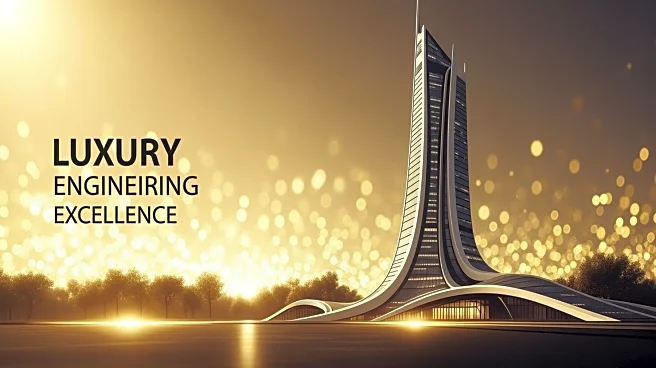What's Happening?
The Burj Al Arab, a self-proclaimed 7-star hotel, stands as a testament to architectural innovation and luxury in Dubai. Built on an artificial island, the hotel reaches 321 meters in height and features
a Teflon-coated fiberglass facade. This iconic structure, designed by architect Tom Wright, symbolizes exclusivity and national prosperity. The hotel offers 202 duplex suites, each equipped with opulent amenities, and is renowned for its exceptional service, including 24-hour butlers and a fleet of Rolls-Royces. The Burj Al Arab has become a global brand of ostentation and status, attracting elite visitors worldwide.
Why It's Important?
The Burj Al Arab represents a significant milestone in Dubai's urban development and tourism strategy. Its construction marked the beginning of Dubai's transformation into a global hub for luxury tourism and architectural innovation. The hotel's design and marketing have positioned Dubai as a leader in the hospitality industry, driving economic growth and international investment. The Burj Al Arab's success has inspired similar projects, contributing to the city's reputation as a center for cutting-edge engineering and luxury living.
What's Next?
The Burj Al Arab continues to influence Dubai's urban planning and tourism strategies. As the city expands its portfolio of luxury offerings, new developments may seek to emulate the hotel's success by integrating advanced engineering and exclusive services. The ongoing evolution of Dubai's skyline, including projects like the Palm Jumeirah and Burj Khalifa, reflects the city's commitment to maintaining its status as a premier destination for global travelers. Future initiatives may focus on sustainability and technological innovation to enhance the city's appeal.
Beyond the Headlines
The Burj Al Arab's construction and marketing strategies highlight the role of luxury as a tool for urban development. The hotel's emphasis on exclusivity and status has reshaped perceptions of Dubai, positioning it as a symbol of ambition and national identity. The integration of advanced materials and engineering techniques in the hotel's design reflects broader trends in architectural innovation, influencing global standards for luxury construction. The Burj Al Arab's impact extends beyond tourism, contributing to Dubai's cultural and economic narrative.








